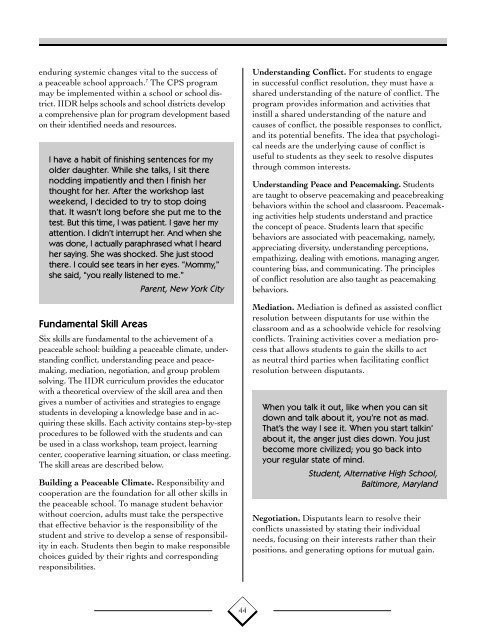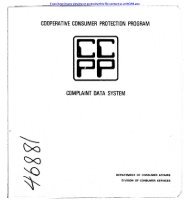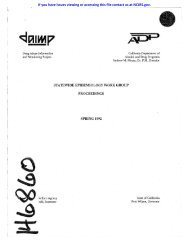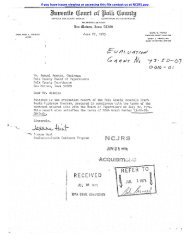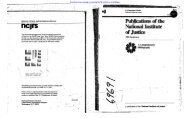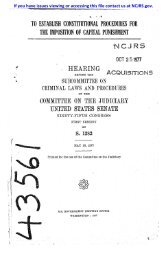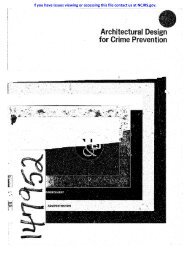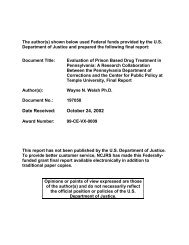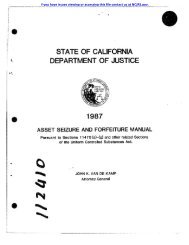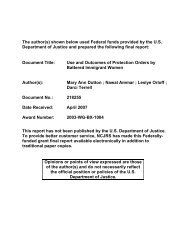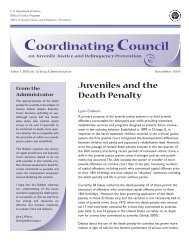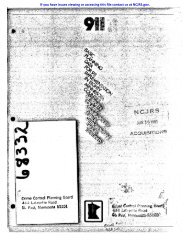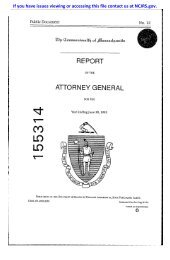Conflict Resolution Education - National Criminal Justice Reference ...
Conflict Resolution Education - National Criminal Justice Reference ...
Conflict Resolution Education - National Criminal Justice Reference ...
Create successful ePaper yourself
Turn your PDF publications into a flip-book with our unique Google optimized e-Paper software.
enduring systemic changes vital to the success of<br />
a peaceable school approach. 7 The CPS program<br />
may be implemented within a school or school district.<br />
IIDR helps schools and school districts develop<br />
a comprehensive plan for program development based<br />
on their identified needs and resources.<br />
I have a habit of finishing sentences for my<br />
older daughter. While she talks, I sit there<br />
nodding impatiently and then I finish her<br />
thought for her. After the workshop last<br />
weekend, I decided to try to stop doing<br />
that. It wasn’t long before she put me to the<br />
test. But this time, I was patient. I gave her my<br />
attention. I didn’t interrupt her. And when she<br />
was done, I actually paraphrased what I heard<br />
her saying. She was shocked. She just stood<br />
there. I could see tears in her eyes. “Mommy,”<br />
she said, “you really listened to me.”<br />
Parent, New York City<br />
Fundamental Skill Areas<br />
Six skills are fundamental to the achievement of a<br />
peaceable school: building a peaceable climate, understanding<br />
conflict, understanding peace and peacemaking,<br />
mediation, negotiation, and group problem<br />
solving. The IIDR curriculum provides the educator<br />
with a theoretical overview of the skill area and then<br />
gives a number of activities and strategies to engage<br />
students in developing a knowledge base and in acquiring<br />
these skills. Each activity contains step-by-step<br />
procedures to be followed with the students and can<br />
be used in a class workshop, team project, learning<br />
center, cooperative learning situation, or class meeting.<br />
The skill areas are described below.<br />
Building a Peaceable Climate. Responsibility and<br />
cooperation are the foundation for all other skills in<br />
the peaceable school. To manage student behavior<br />
without coercion, adults must take the perspective<br />
that effective behavior is the responsibility of the<br />
student and strive to develop a sense of responsibility<br />
in each. Students then begin to make responsible<br />
choices guided by their rights and corresponding<br />
responsibilities.<br />
44<br />
Understanding <strong>Conflict</strong>. For students to engage<br />
in successful conflict resolution, they must have a<br />
shared understanding of the nature of conflict. The<br />
program provides information and activities that<br />
instill a shared understanding of the nature and<br />
causes of conflict, the possible responses to conflict,<br />
and its potential benefits. The idea that psychological<br />
needs are the underlying cause of conflict is<br />
useful to students as they seek to resolve disputes<br />
through common interests.<br />
Understanding Peace and Peacemaking. Students<br />
are taught to observe peacemaking and peacebreaking<br />
behaviors within the school and classroom. Peacemaking<br />
activities help students understand and practice<br />
the concept of peace. Students learn that specific<br />
behaviors are associated with peacemaking, namely,<br />
appreciating diversity, understanding perceptions,<br />
empathizing, dealing with emotions, managing anger,<br />
countering bias, and communicating. The principles<br />
of conflict resolution are also taught as peacemaking<br />
behaviors.<br />
Mediation. Mediation is defined as assisted conflict<br />
resolution between disputants for use within the<br />
classroom and as a schoolwide vehicle for resolving<br />
conflicts. Training activities cover a mediation process<br />
that allows students to gain the skills to act<br />
as neutral third parties when facilitating conflict<br />
resolution between disputants.<br />
When you talk it out, like when you can sit<br />
down and talk about it, you’re not as mad.<br />
That’s the way I see it. When you start talkin’<br />
about it, the anger just dies down. You just<br />
become more civilized; you go back into<br />
your regular state of mind.<br />
Student, Alternative High School,<br />
Baltimore, Maryland<br />
Negotiation. Disputants learn to resolve their<br />
conflicts unassisted by stating their individual<br />
needs, focusing on their interests rather than their<br />
positions, and generating options for mutual gain.


